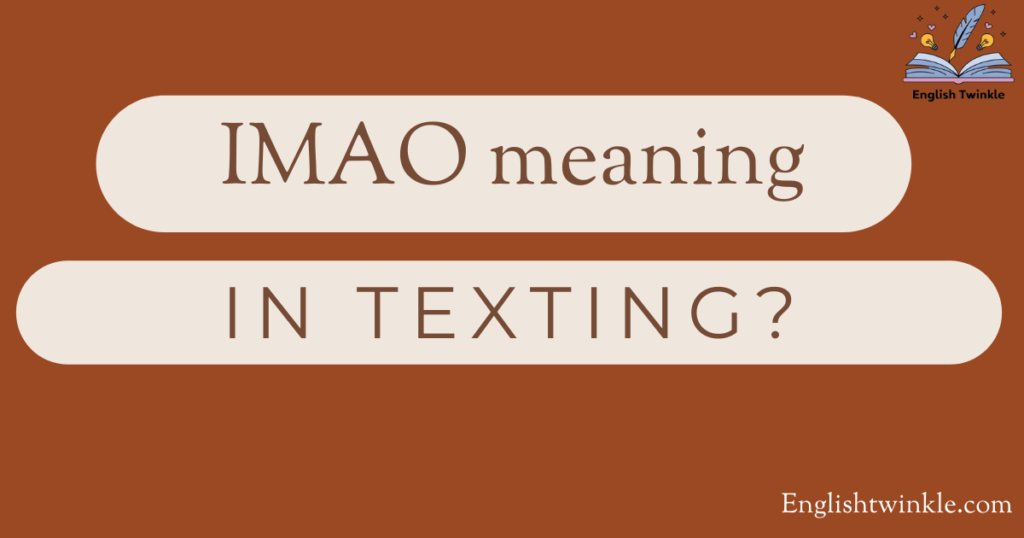If you’ve ever seen someone write “IMAO” online and felt lost, you’re not alone. Many people stumble upon this term in texts or social media posts and wonder what it actually means. IMAO meaning stands for “In My Arrogant Opinion” and, just like its humble cousin IMHO (In My Humble Opinion), it’s a staple of online slang. People often use it to add a humorous twist to their messages. But beyond that, IMAO embodies the spirit of today’s internet culture—full of sarcasm, irony, and a little self-deprecating humor.
In this guide, we’ll dive deep into the meaning, history, and context of IMAO. We’ll also look at how it’s different from IMHO, explore some examples of IMAO in real conversations, and learn when it’s appropriate to use this term. By the end, you’ll be fully equipped to understand and use IMAO like a pro, helping you connect with others in a fun, laid-back way on various online communication platforms.
What Does IMAO Meaning in Text?
IMAO stands for “In My Arrogant Opinion,” and it’s used frequently in casual, informal language to signal that the speaker knows their opinion might come across as bold or even a bit arrogant. Unlike IMHO, which softens opinions with a tone of humility, IMAO meaning uses humor and irony to give the speaker a voice that’s both opinionated and funny. For instance, if someone is absolutely certain about a movie being terrible, they might say, “IMAO, that movie was a complete waste of time.” By using IMAO, they’re not just sharing their view; they’re also adding a playful, bold touch.
In the world of online chatting, tone and context can be hard to convey through text alone. That’s where phrases like IMAO and IMHO come in handy. They help set the tone of a message, letting others know whether it’s meant to be serious, funny, or somewhere in between. For instance, while IMHO might make a statement seem softer or even polite, IMAO does the opposite, giving the text a confident, slightly sarcastic tone that’s ideal for informal, fun conversations.

IMAO Meaning Full Form
The full form of IMAO—“In My Arrogant Opinion”—reflects the playful nature of modern internet slang. By calling their own opinion “arrogant,” the speaker is often poking fun at themselves or playfully exaggerating their stance. It’s a great example of ironic language that’s popular online, where people enjoy mixing humor with strong opinions.
To understand IMAO fully, it’s essential to see it as part of the larger trend of digital acronyms and sarcastic texting phrases. In many ways, IMAO allows users to add an extra layer of meaning to their words. It says, “I know I sound opinionated here, and I’m not afraid to show it.” This self-aware tone is one reason why IMAO has become so popular in online discussions and social media language, especially where people enjoy debating everything from movies to politics.
Origins of IMAO and IMHO
Like most internet slang, the history of IMAO is tied to the history of IMHO (“In My Humble Opinion”). IMHO was one of the earliest internet acronyms to gain popularity in online communication. It allowed people to share opinions gently, often in discussion forums and early chat rooms. Over time, though, the internet evolved, and so did the language. IMAO emerged as a humorous spin-off, adding a dose of sarcasm that fits perfectly with today’s social media slang.
While we don’t know the exact origin of IMAO, it likely emerged in the late 1990s or early 2000s, around the same time as other informal texting language became mainstream. Its rise reflects the shift in internet culture towards a more ironic, humor-focused communication style. Now, IMAO is a staple in many people’s texting vocabulary, often used alongside other casual internet expressions.
IMAO as an Ironic and Self-Deprecating Acronym
The key to IMAO lies in its irony. By calling their own opinion “arrogant,” the speaker is almost always being self-deprecating. In fact, the humor of IMAO often comes from the fact that the opinion might not be arrogant at all. Imagine someone saying, “IMAO, pineapple does belong on pizza.” This isn’t exactly an “arrogant” stance, but using IMAO makes the statement more entertaining and memorable.
This sarcastic humor in texting is central to why IMAO works so well in informal language. People use it to make statements more playful, showing they don’t take themselves too seriously. It’s also a good way to soften a strong opinion, especially in online communication platforms where tone can sometimes be misunderstood.
IMAO vs. IMHO: Key Differences
While IMAO and IMHO look similar, they’re used in different ways. IMHO stands for “In My Humble Opinion,” a phrase that helps make statements sound gentle or respectful. On the other hand, IMAO does the opposite. It takes a bolder stance, often with an ironic language twist. While IMHO may make someone sound modest, IMAO is usually a playful, exaggerated way to show confidence.
Here’s a comparison table to help clarify the differences:
| Acronym | Full Form | Tone | Usage Example |
|---|---|---|---|
| IMHO | In My Humble Opinion | Polite, Modest | IMHO, that show was quite enjoyable. |
| IMAO | In My Arrogant Opinion | Bold, Ironic | IMAO, that show was a total waste of time. |
By understanding these nuances, it’s easier to choose the right acronym based on the situation. IMHO works well when someone wants to keep the conversation friendly, while IMAO is great for adding a dose of sarcasm in texting.

Examples of IMAO in Conversation
In real conversations, IMAO appears most often in online chatting and social media slang. It’s common on platforms like Twitter, Reddit, and even Instagram, where people like to share opinions with a hint of sarcasm. Here are a few examples:
- “IMAO, coffee is just overrated.”
- “IMAO, the movie wasn’t worth the hype.”
- “Everyone loves it, but IMAO, it’s just okay.”
In each example, IMAO gives the statement a confident, humorous twist. It suggests that the person is aware of their own strong opinion, which helps to keep the tone light and engaging, even when the opinion is bold.
Using IMAO in Internet Language and Social Media
With the rise of social media slang, IMAO has become a common part of everyday digital conversations. People use it on platforms like Facebook, Twitter, and Instagram, especially in comment sections and discussion groups. It’s especially popular on Reddit and Twitter, where discussions can range from casual topics to more heated debates, and IMAO adds humor without making things too serious.
IMAO fits perfectly into the world of online communication because it’s both bold and self-aware. In a world where tone is difficult to convey through text, IMAO helps people express confidence without seeming rude. It’s also a great example of texting humor that relies on context and tone, making it a versatile tool for sarcastic expressions.
The Spread of IMAO in Online Culture
As internet slang popularity has grown, IMAO has spread widely beyond just text messages. It’s part of a broader shift towards informal texting language that includes phrases like “LOL,” “BRB,” and “IDK.” This kind of language makes digital communication faster and more expressive, with each acronym serving a unique purpose. IMAO specifically adds a touch of irony, making it an ideal fit for social media.
With the internet’s global reach, terms like IMAO have crossed borders and are now recognized in various parts of the world. However, it’s especially popular in the USA, where people enjoy using opinionated language online. By understanding and using IMAO, users can more easily participate in online discussions and connect with others through a shared sense of humor.
Other Meanings of IMAO
Although IMAO is widely recognized as “In My Arrogant Opinion,” some people might use it differently. As with many acronyms, the meaning can shift based on context. However, IMAO primarily remains associated with irony and sarcasm. In rare cases, IMAO could be used in different contexts, but it’s essential to rely on context to understand its intended meaning.
For the most part, though, people using IMAO online are signaling humor, confidence, or even a slight exaggeration. While other digital acronyms might have multiple meanings, IMAO typically sticks to its ironic, self-aware roots.
Source
Here are five general sources that can provide background information and context for an article on the acronym “IMAO” and similar internet slang:
- Urban Dictionary – Often provides definitions, usage examples, and community insights on internet slang, including “IMAO” and related terms.
- Merriam-Webster’s Words We’re Watching – Merriam-Webster sometimes features internet slang terms and evolving acronyms, discussing their origins and usage.
- Oxford English Dictionary (OED) – The OED offers definitions and historical context for internet slang that has gained widespread usage, including both “IMAO” and “IMHO.”
- Know Your Meme – This site explores the cultural context and origin of internet slang, memes, and abbreviations, including discussions of ironic language and humor in texting.
- NetLingo – An online dictionary that covers a wide variety of internet terms, abbreviations, and acronyms with insights into digital communication trends.
Each of these sources dives into different aspects of IMAO’s definition, examples, and cultural context, which can help you get a comprehensive understanding of this acronym’s place in internet slang.

